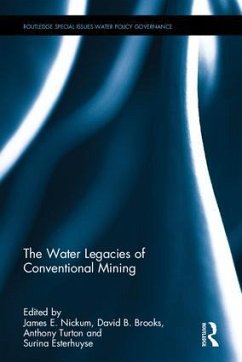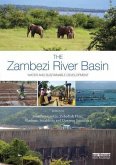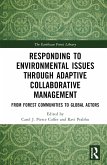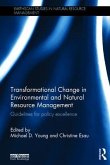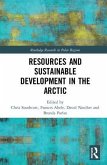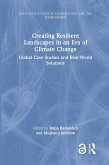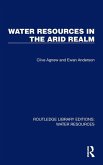The Water Legacies of Conventional Mining
Herausgeber: Nickum, James E; Esterhuyse, Surina; Turton, Anthony; Brooks, David B
The Water Legacies of Conventional Mining
Herausgeber: Nickum, James E; Esterhuyse, Surina; Turton, Anthony; Brooks, David B
- Gebundenes Buch
- Merkliste
- Auf die Merkliste
- Bewerten Bewerten
- Teilen
- Produkt teilen
- Produkterinnerung
- Produkterinnerung
The impact of mining is too big to ignore in a world of oversubscribed water. This is true of conventional mining as much as - or even more than - hydraulic fracturing (fracking). The chapters in this book were originally published in the journal Water International.
Andere Kunden interessierten sich auch für
![The Zambezi River Basin The Zambezi River Basin]() The Zambezi River Basin197,99 €
The Zambezi River Basin197,99 €![Responding to Environmental Issues Through Adaptive Collaborative Management Responding to Environmental Issues Through Adaptive Collaborative Management]() Responding to Environmental Issues Through Adaptive Collaborative Management174,99 €
Responding to Environmental Issues Through Adaptive Collaborative Management174,99 €![Transformational Change in Environmental and Natural Resource Management Transformational Change in Environmental and Natural Resource Management]() Transformational Change in Environmental and Natural Resource Management131,99 €
Transformational Change in Environmental and Natural Resource Management131,99 €![Resources and Sustainable Development in the Arctic Resources and Sustainable Development in the Arctic]() Resources and Sustainable Development in the Arctic198,99 €
Resources and Sustainable Development in the Arctic198,99 €![New Challenges to Food Security New Challenges to Food Security]() New Challenges to Food Security180,99 €
New Challenges to Food Security180,99 €![Creating Resilient Landscapes in an Era of Climate Change Creating Resilient Landscapes in an Era of Climate Change]() Creating Resilient Landscapes in an Era of Climate Change174,99 €
Creating Resilient Landscapes in an Era of Climate Change174,99 €![Water Resources in the Arid Realm Water Resources in the Arid Realm]() Clive AgnewWater Resources in the Arid Realm121,99 €
Clive AgnewWater Resources in the Arid Realm121,99 €-
-
-
The impact of mining is too big to ignore in a world of oversubscribed water. This is true of conventional mining as much as - or even more than - hydraulic fracturing (fracking). The chapters in this book were originally published in the journal Water International.
Hinweis: Dieser Artikel kann nur an eine deutsche Lieferadresse ausgeliefert werden.
Hinweis: Dieser Artikel kann nur an eine deutsche Lieferadresse ausgeliefert werden.
Produktdetails
- Produktdetails
- Verlag: Taylor & Francis
- Seitenzahl: 236
- Erscheinungstermin: 21. Juni 2017
- Englisch
- Abmessung: 244mm x 170mm x 14mm
- Gewicht: 576g
- ISBN-13: 9781138288713
- ISBN-10: 1138288713
- Artikelnr.: 57053421
- Herstellerkennzeichnung
- Libri GmbH
- Europaallee 1
- 36244 Bad Hersfeld
- gpsr@libri.de
- Verlag: Taylor & Francis
- Seitenzahl: 236
- Erscheinungstermin: 21. Juni 2017
- Englisch
- Abmessung: 244mm x 170mm x 14mm
- Gewicht: 576g
- ISBN-13: 9781138288713
- ISBN-10: 1138288713
- Artikelnr.: 57053421
- Herstellerkennzeichnung
- Libri GmbH
- Europaallee 1
- 36244 Bad Hersfeld
- gpsr@libri.de
James E. Nickum is an institutional economist, affiliated with the Centre for Water and Development at SOAS, UK, and the University of Hong Kong. David B. Brooks is a natural resource economist working mainly in North America and the Middle East; he is affiliated with the International Institute for Sustainable Development in Manitoba, Canada. Anthony Turton is a water strategist in both the academic and commercial world, affiliated with the Centre for Environmental Management at the University of Free State, Bloemfontein, South Africa. Surina Esterhuyse is a geohydrologist working on oil and gas extraction in South Africa, and affiliated with the Centre for Environmental Management at the University of Free State, Bloemfontein, South Africa.
1. Introduction David B. Brooks, James E. Nickum, Anthony Turton and Surina
Esterhuyse 2. Untying the Gordian Knot: unintended consequences of water
policy for the gold mining industry in South Africa Anthony Turton 3. Mine
site water-reporting practices, groundwater take and governance frameworks
in the Hunter Valley coalfield, Australia Wendy Timms and Cameron Holley
4. Non-discrimination and liability for transboundary acid mine drainage
pollution of South Africa's rivers: could the UN Watercourses Convention
open Pandora's mine? Rémy Kinna 5. A pilot study of the Social Water
Assessment Protocol in a mining region of Ghana Anastasia N. Danoucaras,
Alidu Babatu Adam, Kathryn Sturman, Nina K. Collins and Alan Woodley 6.
Unconventional oil and gas extraction in South Africa: water linkages
within the population-environment-development nexus and its policy
implications Surina Esterhuyse, Nola Redelinghuys and Marthie Kemp 7.
Lessons from Yanacocha: assessing mining impacts on hydrological systems
and water distribution in the Cajamarca region, Peru Diana Vela-Almeida,
Froukje Kuijk, Guido Wyseure and Nicolas Kosoy 8. Disputes over land and
water rights in gold mining: the case of Cerro de San Pedro, Mexico Didi
Stoltenborg and Rutgerd Boelens 9. Mining and campesino engagement: an
opportunity for integrated water resources management in Ancash, Peru
Robert Patrick and Lalita Bharadwaj 10. Questioning the effectiveness of
planned conflict resolution strategies in water disputes between rural
communities and mining companies in Peru Milagros Sosa and Margreet
Zwarteveen 11. Predicting water quality associated with land cover change
in the Grootdrai Dam catchment, South Africa Anja du Plessis, Tertius
Harmse and Fethi Ahmed 12. Assessing the existing knowledge base and
opinions of decision makers on the regulation and monitoring of
unconventional gas mining in South Africa Surina Esterhuyse, Marthie Kemp
and Nola Redelinghuys
Esterhuyse 2. Untying the Gordian Knot: unintended consequences of water
policy for the gold mining industry in South Africa Anthony Turton 3. Mine
site water-reporting practices, groundwater take and governance frameworks
in the Hunter Valley coalfield, Australia Wendy Timms and Cameron Holley
4. Non-discrimination and liability for transboundary acid mine drainage
pollution of South Africa's rivers: could the UN Watercourses Convention
open Pandora's mine? Rémy Kinna 5. A pilot study of the Social Water
Assessment Protocol in a mining region of Ghana Anastasia N. Danoucaras,
Alidu Babatu Adam, Kathryn Sturman, Nina K. Collins and Alan Woodley 6.
Unconventional oil and gas extraction in South Africa: water linkages
within the population-environment-development nexus and its policy
implications Surina Esterhuyse, Nola Redelinghuys and Marthie Kemp 7.
Lessons from Yanacocha: assessing mining impacts on hydrological systems
and water distribution in the Cajamarca region, Peru Diana Vela-Almeida,
Froukje Kuijk, Guido Wyseure and Nicolas Kosoy 8. Disputes over land and
water rights in gold mining: the case of Cerro de San Pedro, Mexico Didi
Stoltenborg and Rutgerd Boelens 9. Mining and campesino engagement: an
opportunity for integrated water resources management in Ancash, Peru
Robert Patrick and Lalita Bharadwaj 10. Questioning the effectiveness of
planned conflict resolution strategies in water disputes between rural
communities and mining companies in Peru Milagros Sosa and Margreet
Zwarteveen 11. Predicting water quality associated with land cover change
in the Grootdrai Dam catchment, South Africa Anja du Plessis, Tertius
Harmse and Fethi Ahmed 12. Assessing the existing knowledge base and
opinions of decision makers on the regulation and monitoring of
unconventional gas mining in South Africa Surina Esterhuyse, Marthie Kemp
and Nola Redelinghuys
1. Introduction David B. Brooks, James E. Nickum, Anthony Turton and Surina
Esterhuyse 2. Untying the Gordian Knot: unintended consequences of water
policy for the gold mining industry in South Africa Anthony Turton 3. Mine
site water-reporting practices, groundwater take and governance frameworks
in the Hunter Valley coalfield, Australia Wendy Timms and Cameron Holley
4. Non-discrimination and liability for transboundary acid mine drainage
pollution of South Africa's rivers: could the UN Watercourses Convention
open Pandora's mine? Rémy Kinna 5. A pilot study of the Social Water
Assessment Protocol in a mining region of Ghana Anastasia N. Danoucaras,
Alidu Babatu Adam, Kathryn Sturman, Nina K. Collins and Alan Woodley 6.
Unconventional oil and gas extraction in South Africa: water linkages
within the population-environment-development nexus and its policy
implications Surina Esterhuyse, Nola Redelinghuys and Marthie Kemp 7.
Lessons from Yanacocha: assessing mining impacts on hydrological systems
and water distribution in the Cajamarca region, Peru Diana Vela-Almeida,
Froukje Kuijk, Guido Wyseure and Nicolas Kosoy 8. Disputes over land and
water rights in gold mining: the case of Cerro de San Pedro, Mexico Didi
Stoltenborg and Rutgerd Boelens 9. Mining and campesino engagement: an
opportunity for integrated water resources management in Ancash, Peru
Robert Patrick and Lalita Bharadwaj 10. Questioning the effectiveness of
planned conflict resolution strategies in water disputes between rural
communities and mining companies in Peru Milagros Sosa and Margreet
Zwarteveen 11. Predicting water quality associated with land cover change
in the Grootdrai Dam catchment, South Africa Anja du Plessis, Tertius
Harmse and Fethi Ahmed 12. Assessing the existing knowledge base and
opinions of decision makers on the regulation and monitoring of
unconventional gas mining in South Africa Surina Esterhuyse, Marthie Kemp
and Nola Redelinghuys
Esterhuyse 2. Untying the Gordian Knot: unintended consequences of water
policy for the gold mining industry in South Africa Anthony Turton 3. Mine
site water-reporting practices, groundwater take and governance frameworks
in the Hunter Valley coalfield, Australia Wendy Timms and Cameron Holley
4. Non-discrimination and liability for transboundary acid mine drainage
pollution of South Africa's rivers: could the UN Watercourses Convention
open Pandora's mine? Rémy Kinna 5. A pilot study of the Social Water
Assessment Protocol in a mining region of Ghana Anastasia N. Danoucaras,
Alidu Babatu Adam, Kathryn Sturman, Nina K. Collins and Alan Woodley 6.
Unconventional oil and gas extraction in South Africa: water linkages
within the population-environment-development nexus and its policy
implications Surina Esterhuyse, Nola Redelinghuys and Marthie Kemp 7.
Lessons from Yanacocha: assessing mining impacts on hydrological systems
and water distribution in the Cajamarca region, Peru Diana Vela-Almeida,
Froukje Kuijk, Guido Wyseure and Nicolas Kosoy 8. Disputes over land and
water rights in gold mining: the case of Cerro de San Pedro, Mexico Didi
Stoltenborg and Rutgerd Boelens 9. Mining and campesino engagement: an
opportunity for integrated water resources management in Ancash, Peru
Robert Patrick and Lalita Bharadwaj 10. Questioning the effectiveness of
planned conflict resolution strategies in water disputes between rural
communities and mining companies in Peru Milagros Sosa and Margreet
Zwarteveen 11. Predicting water quality associated with land cover change
in the Grootdrai Dam catchment, South Africa Anja du Plessis, Tertius
Harmse and Fethi Ahmed 12. Assessing the existing knowledge base and
opinions of decision makers on the regulation and monitoring of
unconventional gas mining in South Africa Surina Esterhuyse, Marthie Kemp
and Nola Redelinghuys

